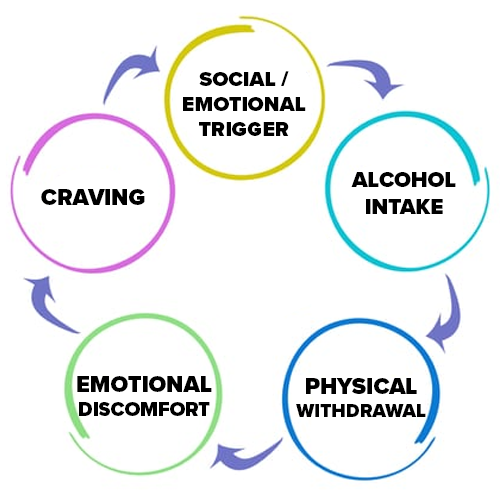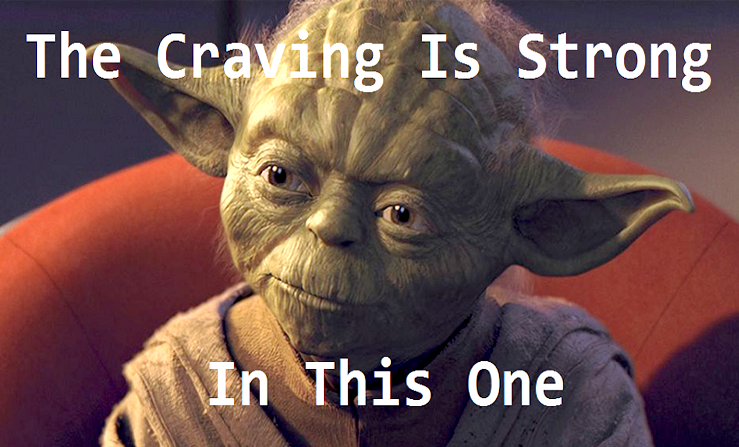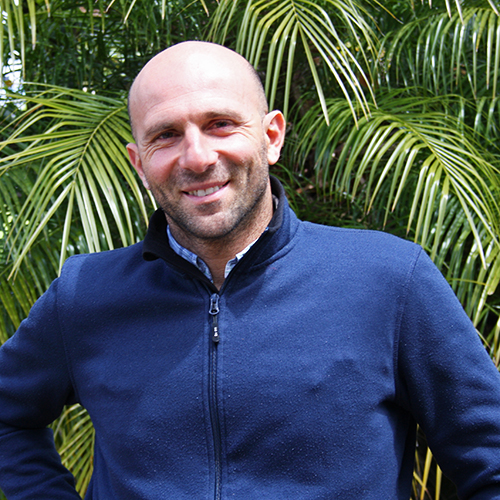Drugs by nature are addictive. In the last article in this series, we established that alcohol is legal drug. Its consumption is promoted as fun, inclusive and relaxing. Is it any wonder then that the brain – which is conditioned to seek more pleasure – works right into the hands of the lucrative alcohol industry and gradually develops a dependence on this addictive drug? Once alcohol consumption has become intrinsically linked with our social interactions, emotional responses and coping mechanisms, it is incredibly easy for alcohol use to develop into misuse, then dependency and addiction.
What causes alcohol addiction?
Taking the drug (in this case alcohol) creates withdrawal, which leads to anxiety and desire for more of that drug to alleviate the feelings and physical symptoms created by the withdrawal – even in small amounts. The infamous hangover – a socially acceptable, often humorous yet highly debilitating condition – is actually the body suffering withdrawal from the drug alcohol.

A hangover is the body desperately trying to rid itself of a dangerous toxin, while the amygdala is crying out for more alcohol to alleviate the uncomfortableness of running out. In short, drinking alcohol leads unavoidably to physical withdrawal symptoms. The primitive part of the brain (that damned amygdala!) screams out for more of the drug to alleviate its discomfort. This then makes us consciously uncomfortable in the form of obsessive thoughts and cravings. Hence the vicious cycle of addiction repeats.
Stopping the physical intake (detoxing) is the first and easiest step
What??!?! I hear you say. It may be hard to entertain, but the physical cravings for alcohol are short-lived –just five to seven days. It is actually the deep seated (mostly subconscious) emotional cravings that are the most powerful to overcome. There is an incredible difference between these two types of cravings.

The body’s physical cravings for alcohol are – once again – controlled by that primal, reptilian part of the brain, the amygdala. For most people suffering from a severe alcohol addiction, the acute withdrawal stage from physical addiction lasts between five and seven days. The Healthline website has a great timeline HERE if you’d like to explore this in more detail.
PLEASE NOTE: A supervised detox for severe addiction is recommended as the effects of acute withdrawal can be life threatening in some cases).
How long will it take alcohol to leave my system?
Blood: up to 12 hours
Urine: 3-5 days
Hair: up to 90 days
Why is it so hard to stop drinking?
- Why does that bottle of wine or beer call your name from the fridge after a long hard day?
- Why does the thought of a wedding without alcohol sound like a form of horrific torture?
- Why is it near impossible to put the bottle away when you’d only planned to have two glasses?
- Why – when you set the rule you won’t drink on weekdays – does Thursday night seem close enough to the weekend to give in?….
If physical cravings and the alcohol itself can be eliminated in just one short week, why is it so hard to stop drinking when we try to give up? Addressing the deeply rooted beliefs and comfort-seeking habits we have subconsciously developed around alcohol – this is the life changing, missing link in the recovery process. This is the deep mental and emotional work needed to successfully overcome addiction to alcohol.
The key to recovery from alcohol addiction
Self-awareness is the key that opens the door to a successful recovery. If you have made it this far in the discussion, you most likely already had an inkling that alcohol had become a problem in your life. Many people push on regardless and deny there is a problem at all, so well done! Self-awareness is critical and you have it. What next? As we just discussed, stopping the physical consumption of alcohol is next, allowing the physical cravings to be experienced, to pass and to end. The cycle of physical addiction has now been disrupted.

Then the heavy lifting begins! We need to bring to light and acknowledge the core, underlying false beliefs you have around alcohol that have enabled its emotional, habitual hold over you. These beliefs are most often operating completely at the subconscious level. Some of these beliefs may include:
EXAMPLES OF SUBCONSCIOUS BELIEFS
- I need alcohol to calm my social anxiety
- People don’t find me interesting/funny/intelligent without alcohol
- I’m too self-conscious to enjoy sex without alcohol
- I hate this task / I need a drink to do this
- I can’t handle this situation without drinking
- It won’t be fun without alcohol
- I’m missing out if I don’t drink
- Drinking will make this feel better
- I deserve a drink
- Alcohol is always there for me, it’s my friend
- etc. – these deep beliefs will be personal to you
Identifying these automatic thoughts and subconscious beliefs can be a confronting yet rewarding process. Once they are identified and brought into your consciousness, you then have the incredible opportunity to re-write your core values and beliefs. This life changing work is at the heart of a successful recovery from alcohol addiction.
How can I change my core beliefs around alcohol?
Palladium Private, a private alcohol rehab in Sydney, has developed a highly effective, carefully balanced holistic BioPsychoSocial program that uses a cognitive approach to examine each individual’s thinking patterns and responses to life stimuli. Our psychotherapists seek to uncover and modify the subconscious conditioning and thought processes that have developed in relation to each client’s historic and current life situation and events. By successfully doing so, this eradicates false beliefs and habitual behaviours that previously operated on autopilot.
At Palladium Private we teach that the belief system – which is completely unique to each person – acts as the direct platform for our thoughts, actions, responses and behaviours. We refer to this process as the mind-body connection. It is incredibly powerful. Not only do we live according to our belief system, it often goes unexamined or unquestioned throughout our lives. Using a holistic BioPsychoSocial approach to uncovering these belief systems in a guided, supportive, safe and focused environment has given so many of our past clients the key to life-long recovery from addiction.
Please visit our YouTube channel to watch success stories from some of our previous clients.
NEXT IN THIS SERIES:
- What is an “Alcoholic”?
- So am I an “Alcoholic”?
- Is alcohol a drug?
ABOUT THE AUTHOR:
Emanuele Latino
Palladium Private Program Director & Psychologist
LinkedIn Profile

Emanuele and his team take a compassionate approach to clients’ struggles in order to promote awareness and initiate together the transformative process. Palladium Private’s BioPsychoSocial program approaches a range of treatment modalities from Gestalt, Emotionally Focused Therapy, Dialectical and Cognitive Behaviour Therapy, EMDR, ACT, to Neuropsychotherapy, Sensorymotor Psychotherapy and the Cape Cod Model for Couple Therapy.



